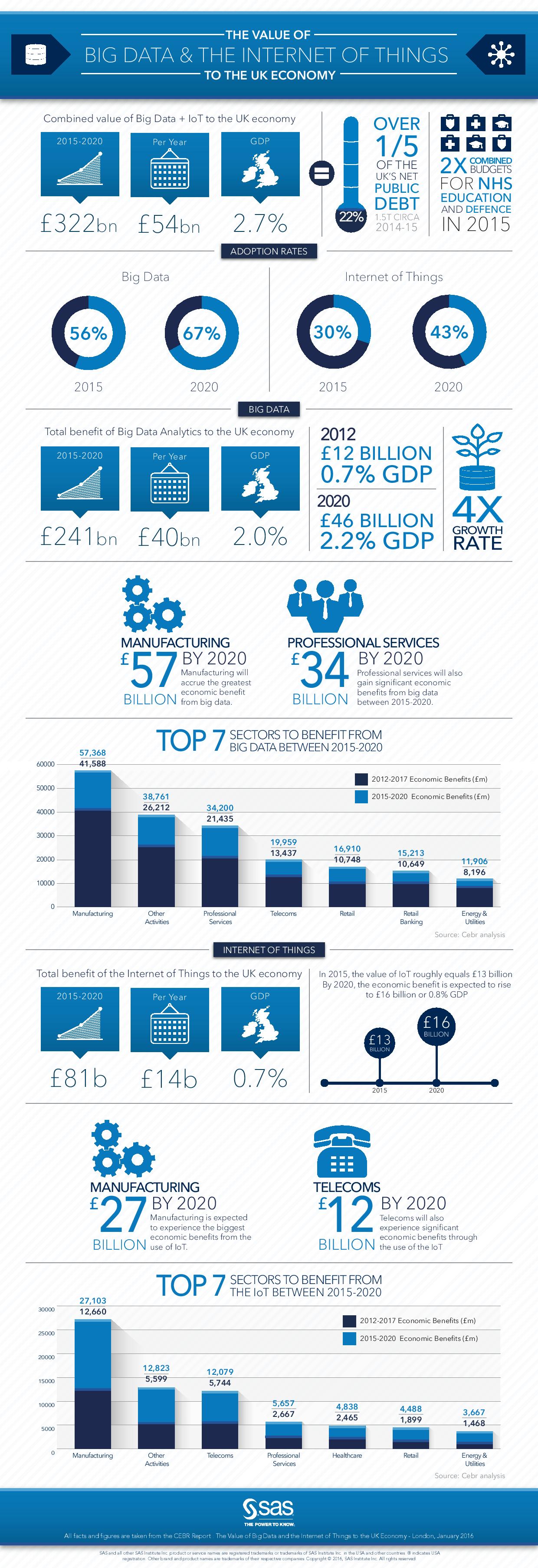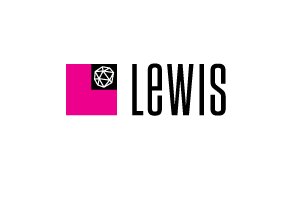Big data analytics and the Internet of Things (IoT) are expected to add $450 billion (£322 billion) to the UK economy from 2015 to 2020. This is twice the size of the combined education,UK National Health Service (NHS) and defence budgets for 2014-15, and more than one-fifth (22%) of the UK’s net public debt (circa. $2.10 trillion [£1.5 trillion] in 2014-15). This equates to an average of $75.47 billion (£54 billion) per year, or 2.7% of the annual GDP over the next five years.
Adoption of big data analytics and IoT are also expected to create 182,000 new jobs over the period from 2015 to 2020.
These findings emerge from research – entitled ‘The value of big data and the Internet of Things to the UK economy’ – by the Centre for Economics and Business Research (Cebr) and SAS, the global provider of analytics software and services. The study builds on the findings in Cebr’s 2012 report, “Data equity: Unlocking the value of big data,” which forecasted the contribution of big data analytics adoption to the UK economy from 2012 to 2017.

“The combined benefits of IoT and big data will fuel our economy like nothing else,” said Mark Wilkinson, SAS regional vice president – Northern Europe and Russia/CIS. “The global environment continues to be in a state of flux, with only one thing certain – that everything is changing. Just under half of UK businesses are not using any form of big data analytics, and those that are will sometimes be using it infrequently in just one or a few areas of the business. Less than one in three have adopted IoT.
“This report illustrates the considerable impact over the coming years of more organisations embracing big data and IoT to improve decision-making that affects efficiency, risk management and new business opportunities. Among the sectors that are set to benefit most over the next few years will be manufacturing, professional services, retail banking and telecoms.”
‘Big data equity’ value quadruples from 2012 to 2020
Big data analytics is estimated to contribute an average of $55.91 billion (£40 billion) per year to the UK economy from 2015 to 2020 (a cumulative value of $336.84 billion [£241 billion] between 2015 and 2020). In the earlier Cebr report, the value of data equity was estimated at $16.77 billion (£12 billion) or 0.7% of GDP in 2012. Following the latest research, the figure is expected to rise to $64.29 billion (£46 billion) in 2020 or 2.2% of GDP – nearly four times the original value. The total data equity benefits come from efficiency savings of $307.49 billion (£220 billion), followed by $16.77 billion (£12 billion) from innovation and $11.18 billion (£8 billion) from business creation.
The industry expected to accrue the greatest economic benefit from big data is manufacturing. The $79.67 billion (£57 billion) boost to this industry over the period 2015-2020 is expected to be driven by the diversity of firms in the industry and the variety of areas in which efficiency gains can be achieved through the use of big data and big data analytics. For example, it could lead to improvements in supply chain management and enhancements in customer intelligence.
The value of Internet of Things to reach $113.21 billion (£81 billion) by 2020
Over 2015 to 2020, the total economic benefit of the IoT is expected to total $113.21 billion (£81 billion), equivalent to an average of $19.57 billion (£14 billion) per year, or 0.7%of annual GDP. In 2015, the estimated value of IoT is roughly equal to $18.17 billion (£13 billion). As adoption rates rise and businesses benefit from efficiency, innovation and creation gains, the value of IoT is predicted to rise to $22.36 billion (£16 billion) by 2020, representing a 0.8% share of forecasted GDP.
As is the case with big data analytics, the manufacturing industry is expected to experience the greatest economic benefit from use of IoT, accumulating to $37.74 billion (£27 billion) by 2020. Similarly, central/local government will likely accrue the lowest economic benefit over the period, reflecting a relatively low rate of IoT adoption.
Adoption rates for big data and IoT
Adoption rates for big data analytics are estimated to rise from 56% in 2015 to 67% by 2020. By comparison, IoT adoption will increase at a slightly higher rate from 30% in 2015 to 43% by 2020.
The telecoms industry has the highest current rate of big data analytics adoption and IoT adoption at 67% and 61% respectively. However, by 2020, businesses in the retail banking sector are expected to be the leaders in big data analytics adoption at 81%, and the telecoms sector is expected to lead the IoT adoption rate at 72%. Healthcare is set to be the laggard in adoption, in both big data analytics (52%) and IoT (26%).
Insight into customer behaviour is a key application of big data, with over two-fifths (42%) of organisations stating that they use big data for this purpose. By comparison, a similar proportion of businesses (39%) tend to use the IoT to reduce costs and gain insight into operational data.
Cebr CEO, Graham Brough, commented: “Collecting and storing data is only the beginning. It is the application of analytics that allows the UK to harness the benefits of big data and the IoT. Our research finds that the majority of firms have implemented between one and three big data analytics solutions.
“However, the key is making sure those solutions are extracting maximum insight which is then turned into business actions. IoT is earlier in its lifecycle, and will provide more data for analysis in areas that may be new to analytics, reinforcing the potential benefits to the UK economy.”
To download the Cebr report click here

Comment on this article below or via Twitter: @ VanillaPlusMag OR @jcvplus










